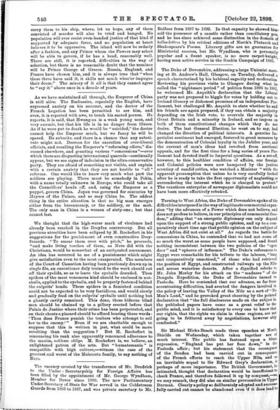We thought that the high-water mark of virulence had already
been reached in the Dreyfus controversy. But all previous atrocities have been eclipsed by M. Rochefort in his suggestions for the punishment of even constructive Drey- fusards. "To smear them over with pitch," he proceeds, "and make living torches of them, as Nero did with the Christians, would be somewhat of an antiquated amusement. An idea has occurred to me of a punishment which might give satisfaction even to the most exasperated. The members of the Court of Caseation having been previously drawn up in single file, an executioner duly trained to the work should cut off their eyelids, so as to leave the eyeballs denuded. Then spiders of the most venomous kind should be enclosed in nut- shells, applied to the eyeballs, and be properly fastened behind the culprits' heads. These spiders in a famished condition could not be expected to be very fastidious, and would slowly and gradually feed on the culprits' eyeballs until nothing but a ghastly cavity remained. This done, these hideous blind men should be chained up to a pillory erected before that Palais de Justice where their crime has been perpetrated, and on their chests a placard should be affixed bearing these words : Thus does France punish the traitors who attempt to sell her to the enemy." Even if we are charitable enough to suppose that this is written in jest, what could be more revolting than the suggestion ? But M. Rochefort in renouncing his rank also apparently renounced adherence to the maxim, noblesse oblige. M. Rochefort is, we believe, an enlightened patron of the arts. But " hmmatomania " is compatible with high culture,—witness the case of the greatest and worst of the Malatesta family, to say nothing of Nero.










































 Previous page
Previous page